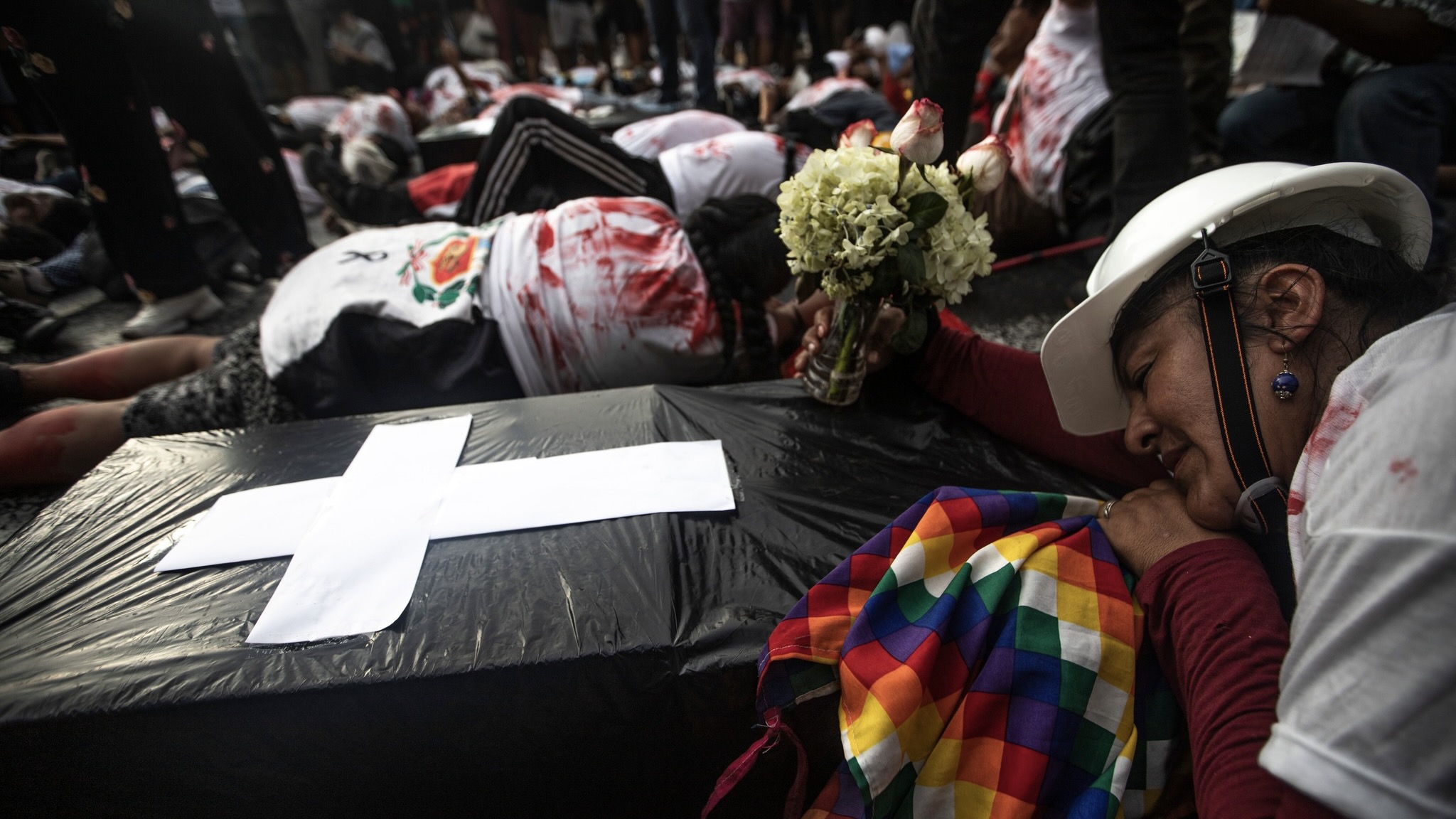On Wednesday, May 3, the Inter-American Commission on Human Rights (IACHR) released its report on the situation of human rights violations in Peru during the anti-government protests that broke out following the ouster of former left-wing president Pedro Castillo in December 2022.
In its 113-page-long report, the IACHR established that the country’s security forces committed “serious human rights violations” as they cracked down on nationwide protests against the Dina Boluarte government.
The IACHR reported that 57 people died in these protests, and said that the state’s response to demonstrators was characterized by the “disproportionate, indiscriminate and lethal use of force.” It added that in some cases, the actions could be classified as “extrajudicial executions” and “massacres.”
“The high number of people killed and injured with shots to the upper half of the body, with firearms and pellets, and the fact that a significant number of victims were not even involved in the protests and were simply in the areas where clashes erupted, confirms mass abuse by state forces,” read the report.
“Since (the abuses) were perpetrated by State agents, the Commission concludes that the deaths that occurred could constitute extrajudicial executions. In addition, given the circumstances of manner, time and place, the multiple deprivations of the right to life could be classified as a massacre,” added the report.
In this regard, the IACHR said that an objective investigation must be conducted “with due diligence and an ethnic-racial approach,” and by “prosecutors specialized in human rights.”
“Besides, they must be judged by independent, competent, and impartial judges,” the human rights organization added.
Delegations of the IACHR visited Peru twice. The first time, from December 20 to 22, 2022, following the massacre in Ayacucho, in which ten people were killed and 52 were severely injured after the police and military tried to unblock the Ayacucho airport that was occupied by protesting residents. The second time, from January 11 to 13, following the massacre in Puno, in which 18 people were killed and 68 were gravely injured after the police officers and soldiers opened fire on thousands of protesters who had occupied the Juliaca airport. Both times, the delegations met with relatives of victims, government officials and civil society representatives.
On December 7, 2022, Castillo was removed from office in a legislative coup by the right-wing dominated Congress. He was subsequently arrested after he tried to dissolve the Congress by decree. Following this, hundreds of thousands of people, mainly from the long-neglected and marginalized countryside of Peru who identify themselves with Castillo, mobilized in different parts of the country to demand Boluarte’s resignation, new elections, and a new constitution.
The government of Castillo’s former vice-president, Dina Boluarte, unleashed brutal repression against those who protested his ousting. According to reports from local media and human rights organizations, around 70 people have been killed in the protests, most of them in violent repression by state security forces.
La @CIDH concluyó que en el Perú se cometieron abusos y masacres entre diciembre 2022 a enero 2023. pic.twitter.com/4tQeLfkJwe
— 🇵🇪 Wayka (@WaykaPeru) May 3, 2023
Recommendations to the Peruvian State
The IACHR made a total of 36 recommendations to the Peruvian State.
The commission urged that the Peruvian State adopt comprehensive reparation measures for the victims such as compensation actions; medical and psychological rehabilitation; social rehabilitation; truth and justice.
The IACHR pointed out that the protests also stemmed from deeper demands by peasant communities and Indigenous peoples, which Peru must address, including “demands for equal access to rights without discrimination, greater political representation, prior consultation concerning extractive projects, and a fair distribution of the wealth generated by these projects.”
The IACHR verified a general deterioration of the public debate, with strong stigmatization due to ethnic-racial and regional factors, through messages that allude to Indigenous people and peasants as ‘terrorists,’ ‘terrucos,’ ‘senderistas,’ ‘cholos,’ or ‘Indios,’ among other derogatory terms, pointing out that these practices are discriminatory. In this regard, it proposed integrating a dialogue strategy “with an ethnic and territorial approach,” as well as guaranteeing the participation of Indigenous peoples and peasant communities.
Regarding the actions of the security forces, it recommended “adopting a permanent and mandatory training and evaluation plan for the public order forces that intervene in the containment of demonstrations, prioritizing the defense of life and the integrity of all people.”
On the matter of public institutions, the IACHR suggested that the Peruvian State “refrain from adopting legislative or constitutional reforms that weaken the autonomy and independence of the National Electoral System or the Judiciary.”
It also recommended “delimiting the mechanisms, such as constitutional accusation, presidential vacancy due to permanent moral incapacity, and unilateral dissolution of Congress.”
Finally, the IACHR expressed its willingness to provide Peru with the technical cooperation required to implement the recommendations made in the report, including the establishment of a special follow-up mechanism.
Boluarte rejects IACHR’s report
On Thursday, May 4, the Boluarte government rejected the IACHR’s report and dismissed its conclusions.
“We reject the supposed findings of extrajudicial killings and the claim of mass massacres,” said Boluarte at a press conference.
She even downplayed the wording of the IACHR’s report, saying that “it did not confirm the occurrence of human rights violations, but that they could have happened.”
In it worth noting that Peru’s Prosecutor’s Office is also investigating Boluarte, along with three of her ministers and police chiefs, for the alleged crimes of genocide, homicide and serious injuries.





